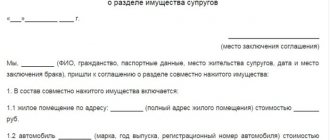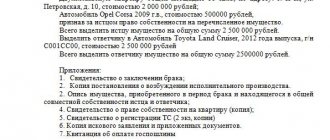The purpose of concluding an agreement on the division of jointly acquired property is the redistribution of property rights. Notarization of such an agreement is possible only if there is a voluntary will of the parties and there are no disagreements between them regarding the transfer of rights to property.
The subject of the agreement will be property relations , namely the termination of joint ownership and the transfer of part or all shares into the personal property of one of the spouses. At the same time, concluding an agreement with a notary provides for the possibility of alienating unequal shares to spouses, or transferring some property entirely to one spouse.
Notarization saves time and money of spouses when dividing joint property, and also minimizes negativity in this matter, since it is carried out by agreement between the spouses.
What is division of marital property?
When purchasing property during marriage, a married couple uses funds from the common budget.
Both spouses bear the costs. The purchased property is also in most cases used jointly or to ensure the interests of the husband and wife. The spouses lead a common life, live together, and raise children. Features of the use of property purchased during marriage are reflected in legislation. All property acquired by a husband and wife is recognized as joint (Article 34 of the RF IC). It does not matter to whom exactly the purchase and sale agreement for a particular property is drawn up. Attention
If joint ownership of the common property of the spouses does not suit the husband or wife, the property can be divided by a notary (Article 38 of the RF IC). This does not require a divorce. The division of property by a notary is a procedure during which the common property of the spouses is transferred to the division of private or shared property, taking into account the interests of the husband or wife. Simply put, each of the participants in the marriage will receive a share or a specific piece of real estate, which they can dispose of at their personal discretion.
What are the ways to divide the property of a husband and wife?
From the provisions of Article 38 of the RF IC it follows that there are two ways to divide the property of spouses: through the court or a notary. First of all, the husband and wife need to identify the existence of differences. If there is no dispute, the married couple must independently divide the property and draw up a voluntary agreement. The finished official paper is subject to notarization (clause 2 of Article 38 of the RF IC). The specialist checks documents for compliance with legal requirements.
IMPORTANT
The division of the jointly acquired property of a husband and wife is carried out in court if there is a dispute (clause 3 of Article 38 of the RF IC). The representative of the authority will determine what property belongs to each of the spouses. If the property cannot be divided, the husband or wife who did not receive a share will be able to claim compensation for the value of the property.
Normative base
The possibility of dividing the property of spouses through a notary is mentioned in Article 38 of the RF IC. However, the legal act states that the specialist does not independently divide the property. Spouses can prepare a voluntary agreement on the division of property. The document must describe the specifics of the distribution of property between husband and wife. The information reflected in the agreement must not contradict the law. In particular, it is worth considering the following provisions of the Family Code of the Russian Federation:
- Article 34. Determines the list of real estate objects that are recognized as the joint property of husband and wife.
- Article 36. Describes what kind of property is recognized as individual and cannot be divided on the basis of a notarized agreement.
- Article 37. Determines the rules for recognizing objects purchased by a husband or wife as joint property of the spouses.
- Article 39. Determines the specifics of distribution of shares. The legal act states that, as a general rule, spouses receive an equal amount of property. However, it is permissible to distribute objects according to a different principle if the husband and wife are voluntarily ready to take such measures.
Voluntary agreement or prenuptial agreement
- A prenuptial agreement can be concluded before marriage and during marriage. If drawn up before marriage, it comes into force after receiving the marriage certificate.
The agreement is drawn up during marriage and after divorce. Comes into force according to the conditions specified by the parties in the agreement.
- The marriage contract is concluded in relation to existing property and the future.
The agreement specifies only the property available at the time the agreement is signed.
- Rights and obligations in a marriage contract are limited by a period or the occurrence/non-occurrence of certain conditions.
The agreement on the division of property is indefinite.
- By marriage contract, spouses have the right to change the regime of joint ownership
The agreement cannot change the property regime established by law.
- The prenuptial agreement allows for a generalized title to the property.
The agreement contains strict requirements for the listing and description of items.
- A description of the debt obligations is not required in the agreement.
The prenuptial agreement describes all debt obligations.
When do you need to formalize the division of marital property with a notary?
Husband and wife have the right to distribute property during marriage. It is also possible to divide property during a divorce (Article 38 of the RF IC). Either spouse can offer to prepare a voluntary agreement for the division of property with a notary. The document is drawn up only if there is mutual consent. If one of the spouses opposes it, or disputes arise during the preparation of the agreement, distribution of property through a notarial procedure is impossible. The division of property will take place in court (Article 38 of the RF IC).
Attention
If the husband and wife divorce, the distribution of common property must be completed within 3 years. However, the statute of limitations for the division of property (if we are talking about the judicial division of real estate) begins to be calculated from the moment of violation of the rights of one of the spouses. With a notary, a husband and wife can distribute property after a divorce indefinitely. If the spouses were able to come to an agreement and continue to use the property together without hindrance, the division of property need not be carried out.
When is an agreement drawn up?
You can divide property and have a written agreement (sample) certified by a notary at any time: while in an active marriage, after a divorce at the request of one of the former marriage partners. In the latter case, you need to remember the statute of limitations. It is 3 years from the moment when the spouse demanding division learned about the violation of his rights, and not from the date of divorce in the registry office or by court decision (clause 1 of Article 200 of the Civil Code of the Russian Federation).
In addition, an agreement on the division of property between spouses with a notary is often drawn up in a situation where creditors file an application with the court for forced collection of debts against one of them. This is a more practical solution, since when the issue is considered in court, family property is most often divided in half. Through a notarial agreement, it can be distributed at your own discretion (Article 38 of the RF IC).
Notary services on the division of property of spouses
The notary works in compliance with the provisions of Law No. 4462-1 of February 11, 1993. If a husband and wife turn to a specialist with a request to divide property, the main task of the representative of the authority is to certify the completed agreement (Article 38 of the RF IC). First, the notary will check the agreement on the division of property of the spouses for compliance with current regulations. If errors are identified, the specialist will return the documents previously accepted for consideration and ask the husband and wife to correct the inaccuracies. Additionally, the notary can:
- help spouses prepare the text of an agreement on the division of property;
- perform typing and printing of documents;
- request the necessary documentation;
- contact the registration authorities on behalf of the spouses.
Additional services provided by a notary during the division of spouses' property are paid separately.
Documents to the notary for an agreement on the division of property
You must provide a package of documents to the notary office:
- passports of the parties to the agreement
- an extract from the Unified State Register or a certificate of ownership of real estate
- passport of a technical device for a car
- receipt of paid state duty
- marriage registration/divorce certificate
- text of the property division agreement
An agreement on the division of property between spouses can be drawn up by a notary for an additional fee.
What property of spouses is subject to division by a notary?
Spouses can divide all joint property from a notary (Article 38 of the RF IC). At the legislative level, property that a husband and wife acquired during marriage is considered joint. A complete list of property subject to division by spouses at the notary is given in Article 34 of the RF IC. The list includes:
- income from any activity;
- pensions, benefits, payments that do not have a designated purpose;
- movable and immovable property;
- deposits, shares, shares;
- securities;
- other property acquired during marriage.
In this case, it does not matter which member of the couple has entered into a purchase and sale agreement or has opened an account with a banking organization. In practice, one of the spouses can do housework or care for children. This does not deprive the husband or wife of the right to joint property, even if the participant in the marriage had no income. Good reasons that do not allow a spouse to carry out work activities may also be taken into account (Article 34 of the RF IC).
However, not all property of spouses is recognized as jointly acquired property. Part of the property of a husband and wife is not subject to division by a notary. The following is recognized as the personal property of each spouse (Article 36 of the RF IC):
- real estate objects owned by a husband and wife before the official registration of family legal relations;
- property received as a gift by a husband or wife during marriage;
- property inherited by a specific spouse;
- a piece of real estate obtained as a result of a gratuitous transaction;
- things for individual use, even if they were acquired from the common funds of the spouses;
- rights to the results of intellectual activity.
Attention:
The exception is jewelry and luxury items (Article 36 of the RF IC). This category of property is recognized as the joint property of the spouses and is subject to division by a notary or through the court.
It is also worth noting that if a married couple has drawn up a marriage contract, then this document establishes provisions on who will receive this or that property in the event of divorce, and accordingly, the division of the property of the spouses at the notary is carried out in this order.
What property is subject to division?
The basic rules that are taken into account when drawing up an agreement on the division of property with a notary are established by Art. 38, 39 RF IC, art. 252, 254 of the Civil Code of the Russian Federation. They are applied taking into account other norms of family, housing, and land legislation. Only common property acquired by the time the transaction is concluded is distributed between the parties.
- Real estate purchased during marriage using joint family funds (land, houses, apartments, garages).
- Real estate purchased with a mortgage (in this case, the mortgage loan outstanding at the time of the divorce or conclusion of the agreement is also subject to division).
- Financial funds in accounts, regardless of who they are registered in, income from labor and other activities.
- Movable items acquired during marriage (cars, furniture, collections), securities (including shares in LLCs, shares).
The following cannot be the subject of a separation agreement between spouses:
- real estate acquired, inherited, privatized by one of the spouses before marriage, received as a gift, registered in the name of children;
- personal belongings and items of use (clothing, phones, etc.), with the exception of jewelry and luxury items;
- money received by a family (one of its members) for its intended purpose (social benefits, maternity capital);
- bank deposits, insurance issued in the name of children.
It is advisable to draw up the agreement directly with the participation of a notary in order to avoid mistakes that may lead to the possibility of challenging it. In our notary office you can get advice and develop a legally competent document taking into account your specific family situation.
Required documents
The notary must ensure that the property to be divided actually belongs to the spouses and was acquired during marriage. Therefore, the husband and wife must provide the appropriate package of documents. The list of official papers is not fixed in the current legislation. The list of documents may vary depending on the type of property to be divided by the spouses at the notary. If it is necessary to differentiate the rights of a husband and wife to a real estate property, you will need:
- purchase and sale agreement, share participation agreement or other papers confirming the fact of purchase of an apartment or house;
- extract from Rosreestr;
- cadastral and technical passport.
The given list of documents is not exhaustive. The notary may request additional documentation from the spouses when dividing property, if it is necessary to clarify any data. When movable property is subject to division, the following papers may be required:
- contract of sale;
- checks and receipts;
- technical certificate.
Please note
Regardless of the type of property, the husband and wife must provide the notary with an identification document and a pre-filled agreement on the division of property. If spouses are afraid of making a mistake when preparing documents, you can contact a specialist at a notary’s office in advance and use the service of filling out the document.
Challenging and terminating the agreement
An agreement on the division of jointly acquired property may be declared invalid by the court as a void or voidable transaction, depending on the grounds for challenging it. It is considered void when:
- the document is not certified by a notary;
- one of the spouses is declared incompetent;
- concluded as “feigned” (the desire to cover up other goals);
- contains non-material conditions (in relation to raising children, etc.).
An agreement can also be challenged as an invalid transaction if it was concluded by spouses, one of whom:
- limited in legal capacity by the court;
- was not able to understand the meaning of his actions or manage them (alcohol intoxication, illness);
- was under the influence of delusion, deception, violence, unfavorable circumstances.
When an agreement on the division of property of spouses is certified by a notary, it is almost impossible to challenge it, since it checks the legal capacity of the spouses and their voluntary expression of will. The term for challenging the agreement is 1 year from the date of certification.
The period for challenging a marriage contract is one year from the moment the spouse learned or should have learned about the violated right. This is not always the date of its certification by a notary; sometimes it is the moment of divorce or the day when the spouse received information about the presence of property that was not taken into account when concluding the contract.
Agreement on the division of property of spouses with a notary
Unlike the courts, the notary will not independently deal with the division of the spouses’ property. The husband and wife must distribute the property between themselves. The specialist will only certify the completed agreement on the division of property (Article 38 of the RF IC). The rules for preparing a document are not legally established. However, the agreement must not contradict existing standards and be drawn up in accordance with the general rules of office work.
The only mention of the form of an agreement on the division of property with a notary is found in Article 161 of the Civil Code of the Russian Federation. The legal act states that the document must be drawn up in writing if the cost of the object exceeds 10,000 rubles.
The agreement on the division of property of spouses with a notary must reflect the following mandatory information:
- information about spouses;
- marital status of the parties;
- the purpose of preparing the document;
- a list of property transferred to each of the spouses;
- detailed description of each of the objects;
- date and place of preparation of the agreement;
- moment of gaining legal force;
- signature of each spouse with transcript.
Information is recorded on standard A4 sheets. Typically, a document is drawn up on a computer and then signed by hand. An agreement on the division of marital property with a notary may take several pages. In this case, each page is signed and then stapled. The action is performed to prevent the loss of sheets. Property must be specified as much as possible. Generalized concepts cannot be used. To minimize the likelihood of confusion, it is best to prepare a division agreement for each type of marital property.
A sample agreement for the division of an apartment during a divorce can be found
Contents of the property division agreement
The agreement states:
- place, date, month and year of compilation
- parties details:
- Full name, date of birth, passport details, place of registration
- Full name of the notary and address of the notary office
- certificate of registration or divorce
- all common property that needs to be divided
- total property value
- division procedure (what property, how and in what time frame should be divided)
- an extract confirming the absence of encumbrances, arrests, and rights of third parties to property
- personal property that cannot be divided
- procedure for making changes and resolving disputes between the parties
- conditions for the agreement to come into force
- in the conclusion full name and signature
In addition to the signatures of the parties, the agreement is affixed with a notary’s seal.
Is it possible for spouses to draw up an agreement on the division of property themselves for a notary?
Article 38 of the RF IC states that an agreement on the division of common property must be notarized. At the same time, the regulatory legal act does not mention that it is the specialist who is required to prepare the document. A husband and wife can draw up an agreement on the division of property themselves for a notary. The requirements for the form of the document are not fixed by law. In fact, the agreement can be drawn up arbitrarily. However, it is necessary to comply with the general principles of office work and specify the property to be divided. If errors are found in the document, the notary will refuse to certify the agreement.
Independent preparation of an agreement on the division of property helps to quickly distribute any jointly acquired property and save spouses money on registration. However, such a document is easy to challenge in court. Therefore, it is better to entrust the conclusion of an agreement on the division of property to a notary.
Is an agreement on the division of property subject to notarization?
Is it necessary to have a property division agreement certified by a notary? An agreement on the division of common property acquired by spouses during marriage must be notarized (Article 38 of the RF IC)
The notary explains to the parties the essence of each clause and the consequences of concluding the agreement. The notary certifies that the parties understand and sign the document voluntarily, without any pressure or threats.
Only after notarization will the document have legal force.
Cost of an agreement on the division of property with a notary
For certification of an agreement on the division of property by a notary, a state fee is charged. Its size depends on the value of the property to be divided. The amount of payment for notary services is set forth in Article 333.24 of the Tax Code of the Russian Federation. Spouses must pay 5% of the contract amount. The minimum state duty is 300 rubles, and the maximum is 20,000 rubles. A husband and wife can pay the fee jointly or assign the responsibility for providing funds to only one of the spouses.
For your information
If a married couple wants to use additional services of a notary office, they will need to pay. The amount depends on the list of actions that the specialist will perform. If a notary is entrusted with drawing up an agreement on the division of property of spouses, an additional amount of 10,000 rubles must be provided. The amount varies depending on the place of residence of the spouses. You can find out the price by contacting a notary or visiting the official website of the authority.
Documents for registering the division of property with a notary
To draw up an agreement on the division of property you will need :
- Passports of spouses (former spouses).
- Documents confirming property rights, as well as purchase and sale agreements in relation to real estate.
- Documents confirming marriage (certificate of marriage or divorce).
- The contract itself. If there is a draft agreement, then providing it electronically to a notary for editing will save time on its preparation.
Amendments to the agreement or its termination occur only through a notarial procedure.
The procedure for registering the division of property between spouses
If spouses want to divide property by agreement through a notary, they must proceed according to the following scheme:
- Discuss with your husband or wife the fate of all property to be divided.
- Document the agreements reached and prepare an agreement based on the information. You can draw up the document yourself or seek help from a notary.
- Collect papers for property subject to division. Documents must show the date the property was purchased. There may be a need for a real estate appraisal. For this purpose, an independent expert is invited.
- Contact a notary and provide a complete package of documentation. The specialist will check the papers for compliance with legal requirements. If no violations are found, the notary certifies the agreement on the division of property.
- Re-register property. Real estate (Federal Law No. 218 of July 13, 2015) and cars (Federal Law No. 283) are subject to state registration.
Is it possible to challenge an agreement on the division of property?
Any citizen who has signed an agreement on the division of property has the right to change the terms of the agreement or terminate it.
If an agreement is reached between the parties, it is possible to make changes to the contract by drawing up an additional agreement or to terminate a previously concluded agreement and draw up a new contract.
If a compromise cannot be reached, the issue will have to be resolved in court. To invalidate an agreement in court, you will need to prove:
- that the agreement was drawn up in violation of current legislation
- one of the parties is declared incompetent
- the interests of the plaintiff are violated
- not a clear interpretation of the contents of the contract
- the document was drawn up and signed after pressure and threats were applied
When indicating the grounds for appeal, you must provide supporting documents (medical certificates, SMS messages, videos, witness statements).
The statement of claim is filed in court. The review period is 2 months.
| Statement of claim for invalidation of an agreement on the division of property of spouses |
State duty
The amount of state duty at a notary when dividing property of spouses is fixed at the legislative level. The amount of the amount is regulated by Article 333.24 of the Tax Code of the Russian Federation. The amount of state duty directly depends on the value of the property. The more expensive the property that is subject to division, the more money the spouses must transfer as a tax fee. The value of the divisible property specified in the agreement is summed up. The state duty is calculated based on the total price of all real estate objects included in the contract (Article 333.24 of the Tax Code of the Russian Federation).
The legislation establishes maximum and minimum fees for dividing property from a notary. Husband and wife must pay at least 300 rubles. The maximum amount of state duty is 20,000 rubles.
How much does it cost to divide property with a notary?
The fundamentals of the legislation of the Russian Federation on notaries dated February 11, 1993 No. 4462-1 completely regulate the activities of notaries. The law provides for only two notarial actions :
- Certificate.
- Witnessing.
Tariffs for performing notarial acts are specified in Art. 22.1 “Fundamentals of the legislation of the Russian Federation on notaries” and Art. 333.24 of the Tax Code of the Russian Federation (since a notary cannot charge more than the established state duty for similar actions performed by officials of executive authorities and local self-government).
The tariff amount and interest rate vary depending on the value of the property specified in the agreement. So:
- If the contract value is up to 1 million rubles inclusive, it will be 0.5% of the contract amount, but not less than 300 rubles.
- From 1,000,001 rub. up to 10 million rubles inclusive will be 5000 rubles. plus 0.3% of the amount over 1 million rubles.
- At a cost of over 10 million rubles. will cost 32,000 rubles. + 0.15% of the amount over 10 million.
- The cost of legal and technical services will be about 4,000 rubles.
In addition to notarial actions, there are also prices for them that are not regulated in any way. Many notaries include in the cost of the service not only the tariff, but also the cost of technical services. Thus, the price is determined by: the tariff + the cost assigned by the notary for legal and technical services.
Division of spouses' inheritance property at a notary
As a general rule, property received by spouses as an inheritance is recognized as individual property, even if the property was received during marriage (Article 36 of the RF IC). Therefore, the division of such property of husband and wife at the notary is not carried out. Spouses who are not property owners cannot insist on the distribution of the property.
However, the spouse who inherited the property becomes the full owner (clause 4 of Article 1152 of the Civil Code of the Russian Federation) and will be able to fully dispose of the property. A citizen who is an heir can transfer part of the property to his ex-husband or wife. To record the expression of will, a deed of gift is drawn up (Article 572 of the Civil Code of the Russian Federation). As part of the agreement before the notary, property and objects belonging to only one spouse are not divided.
Notary services for property division agreement
According to clause 5, part 1, art. 333.24 of the Tax Code of the Russian Federation for certification of contracts, the subject of which is subject to assessment, the amount of the state duty for notarization is 0.5 percent of the contract amount, but not less than 300 rubles and not more than 20,000 rubles.
For example. The spouses jointly own a two-room apartment worth 3,000,000 rubles, a car worth 1,600,000 rubles. and a plot of land for 450,000 rubles. The cost of the contract is RUB 5,050,000.
State duty: 5,050,000 x 0.5% = 25,250 rubles. This is more than the limit value, so only 20,000 rubles are paid.
There is an additional fee for drawing up an agreement with a notary.
Division of property with a notary, spouses with children
As mentioned earlier, the notary does not independently divide the property of the spouses. The specialist only certifies the agreement (Article 38 of the RF IC). Children do not participate in the division of joint property of their parents. Therefore, the child does not appear in the notarial transaction. Spouses share only their property with the notary, without affecting the property of children. At the same time, the husband and wife set the size of their shares at their own request.
The situation changes when the division of property between spouses and children is carried out through the court. During the trial, the judge will try to take into account the interests of all parties. Children are also no exception. The court will take into account the financial situation of the spouses, take into account who the children are staying with, and then make a final decision. As a result, the size of the shares can be changed in favor of the husband or wife with whom the child will live (Article 39 of the RF IC).
Is it possible to cancel an agreement on the division of marital property with a notary?
A transaction certified by a notary on the division of property of spouses can be declared invalid if certain conditions are met. The list of circumstances allowing such a decision to be made is reflected in paragraph 2 of Chapter 9 of the Civil Code of the Russian Federation.
A notarized agreement on the division of property between a husband and wife can be invalidated in the following cases:
- the document was not prepared in writing (Article 168 of the Civil Code of the Russian Federation);
- the provisions of the document violate law and order and morality (Article 169 of the Civil Code of the Russian Federation);
- the agreement on the division of property was recognized as imaginary (Article 170 of the Civil Code of the Russian Federation);
- one of the spouses is declared incompetent (Article 171 of the Civil Code of the Russian Federation).
Attention
It is possible to cancel an agreement on the distribution of property between spouses only in court. The notary who certified the document will be invited to the process. The court will also agree to terminate the transaction if one of the parties can prove that threats, misrepresentation or violence were used against it (paragraph 2 of Chapter 9 of the Civil Code of the Russian Federation).
Agreement on division of property with compensation
If spouses want to divide property with financial compensation, all conditions must be set out in the agreement.
The meaning of such an agreement is that one of the spouses receives the entire property, and the second receives material compensation equal to half the value, or another thing equal in value to the property, which cannot be divided.
For example. The couple purchased a car during their marriage. At the time of drawing up the agreement, the cost of the car was 2 million rubles. It was decided that the car would remain the property of the husband, and the wife would receive compensation in the amount of 1 million rubles.
Problems and nuances
In order for a notary to agree to certify a transaction on the division of property, the spouses must visit the authority together. Arriving at the office confirms that the couple made the decision to draw up the document voluntarily. The notary will definitely explain to the spouses the legal consequences of concluding an agreement on the division of property. Only after the specialist is convinced that the husband and wife understand the result of their actions will the document be certified.
The division of property of a husband and wife through a notary is possible. However, the specialist does not have the right to independently distribute the property of the spouses. A notary only certifies a voluntary agreement on the division of property of a married couple, concluded between husband and wife. In the document, the parties must reflect the list of property for distribution and indicate the person who will receive the property. If necessary, a specialist can provide services for drawing up an agreement. The notary does not take into account the interests of children when dividing the spouse’s property and only confirms that the finished draft document complies with the requirements of the law.
Comments Showing 0 of 0
Differences between an agreement and a prenuptial agreement
At first glance, both the property division agreement and the prenuptial agreement serve the same purpose - to change the general marital property regime. Both documents must be certified by a notary and can be drawn up at any time. However, there are significant differences between them, outlined below.
| Marriage contract | Property division agreement |
| The legal regime of property ownership can regulate the relations of future, not yet existing property. | Division of specific property that exists in kind. |
| Cannot be unfavorable for one of the parties. | May be disproportionate, shares are determined by agreement. |
| Concluded between persons entering into marriage and spouses. | Occurs between actual and former spouses. |
| Fixed notary fee. | A percentage of the value of the property. |
| Creditors must be notified | There is no obligation to notify creditors |
| Compensation, provision of maintenance, participation in each other's expenses, taxes, grounds and terms of challenge are possible general provisions. | |






